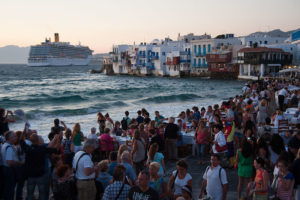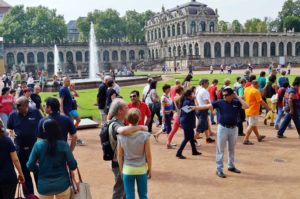 Hordes of people are descending on Europe, destroying local cultures and straining infrastructure. They are descending upon picturesque villages and public squares. Locals are moving out.
Hordes of people are descending on Europe, destroying local cultures and straining infrastructure. They are descending upon picturesque villages and public squares. Locals are moving out.
Some might think that this invasion refers to the immigration crisis. However, these new invaders do not stay. Unlike conquering Caesar, they come, they see, and they leave. They are tourists.
Hundreds of millions of tourists are invading Europe. An estimated 670 million people traveled in Europe last year, and this year many more are expected. They come from all over the world—America, China, the Middle East and Europe itself.
Some might think so many visitors would be good for the local economy. However, most of these tourists stay for too short a time and spend little money. They actually help destroy the places that attract them by crowding tourist sites and displacing locals. Some bustling tourist attractions are going bankrupt by these throngs of tight-fisted visitors who tour Europe with a selfie stick.
Predatory Tourism
Today tourism has lost all restraint. Budget airlines, discount travel sites, and long-distance buses now deliver tens of millions of people to European destinations at basement bargain prices. Cruise ships can deposit thousands of daytime tourists at popular ports where they overwhelm downtowns, leave behind trash and spend very little.
It isn’t ordinary tourism anymore. Some are calling it predatory tourism that devours the marvels of Christian civilization that draw people to Europe.
Tourists used to visit places to see how other people lived. They sought to mix with locals so as to “experience” their culture. While such “traditional” tourists were often annoyances to the locals, they nevertheless went about their daily lives. Today, these sightseers are determining how natives live. They are not “experiencing” the culture but changing it.
What Does Saint Thomas Say About Immigration?

Transforming Into Theme Parks
The German magazine Der Spiegel (8-21-18) featured an extensive and sobering report on how this new tourism threatens to overwhelm Europe and even further destroy national identities.
The new tourism is creating a divide between tourists who occupy the most beautiful places and locals who supply the labor and live elsewhere. The report tells how popular places once prized by locals can be transformed overnight. All it takes is a favorable web site to mention a spot as a location locals gather, and soon tourists come flooding in. Before long, quaint places become infamous tourist traps.
Indeed, tourists now determine the kind of shops that make up most city centers that become special tourist zones. Restaurants that for generations cultivated local patrons with distinctive local dishes now serve mostly tourists who eat with other tourists. Some German locations, for example, will have special menus serving noodles to cater to an increasing number of Asian tourists. In one small Austrian village, for example, restaurants now offer menus in Arabic, featuring pita bread and halal products.
In Greece, Portugal, Spain, and France, more tourists enter the country annually than the number of inhabitants. They flood European cities of all sizes to the point that these cities resemble museums or theme parks. They come to lack the authenticity of being natural places where people gather to live an intense social life. Whirlwind waves of tourists invade, leaving nothing (not even much money). They then retreat, taking away a local bit of “cultural” life in the form of quaint souvenirs, postcards and bric-a-brac that they can show to friends back home.
Overtourism
Some people have taken to calling it overtourism.
The new overtourism not only changes the character of locales, but it also overloads infrastructure. Transportation made for regular use is often crowded beyond capacity. Locals are priced out of the most beautiful parts of their cities by landlords who prefer to rent to tourists. Locals find that tourists have taken over their favorite cafés and restaurants. They feel like strangers in their own land.
Given the strange spending habits of the new tourists, few profit from the money they spend in the area beyond hotel owners and souvenir shopkeepers. The rest have to deal with noise, antics and indifference of the invaders. The stress of this burden adds to the pressure of immigrant populations that have already strained infrastructure and put pressure on the local culture.
Cheap Entertainment
The reason for the invasion is quite arbitrary. Tourists travel because they can. Travel is no longer a luxury in today’s world. Globalization has almost turned access to the world into a human right. Travel, accommodations and event tickets can be obtained with a few clicks at bargain prices. Budget airlines now make it possible for almost anyone to get away.
Emerging nations in Asia, Russia and the Middle East will supply tens of millions of new tourists in the coming decades. The number is expected to rise by 500 million by 2030.
The travel industry has also become a vital economic sector worldwide. It is now larger than the automotive and even the oil industry with a value of well over $7 trillion.
The boom is fueled by massive demand. People no longer seek luxurious and exclusive settings. Overtourism relies upon vast quantities of people in search of cheap places for partying, excitement and entertainment.
 The Destruction of Culture
The Destruction of Culture
There is nothing wrong with visiting other countries. People have always traveled to faraway lands. Traditionally, travelers have learned much by experiencing how others lived, ate and socialized. Local people have also welcomed strangers and learned from them. These were healthy exchanges that favored better relationships between peoples.
All this changed with the dawn of modern tourism in the nineteenth century. Tourism has long been criticized for its superficiality. It creates the illusion that a person has “experienced” another culture just by rapidly visiting a place. Such tourism stresses learning facts about places but and not appreciating culture. It also serves as a means of pleasure-seeking and relief from routine work. Thus, tourism celebrates the individuals who experience the travels, not the culture. It encourages people to put themselves in the center as they later tell others about the trips.
Overtourism in Europe goes one step further by destroying the places and cultures that are visited. These are treasures of Christian civilization that have long attracted people by their beauty and grandeur. The tragedy of overtourism is that these things are taken from the local inhabitants to whom they belong.
[like url=https://www.facebook.com/ReturnToOrder.org]
Much worse, however, is the cultural aspect of the practice. Overtourism poisons the soil in which culture grows. In such a climate, people no longer gather and develop the social relationship so needed to create a way of life. With so many people coming and going, society loses that intimacy that made life so picturesque and interesting. Beautiful places now become mere platforms for entertainment, excitement and social media posts.
Past invaders killed locals and despoiled Europe of its riches. The new tourist invaders take away the soul of a culture and replace it with the frenetic intemperance of a world gone awry.


